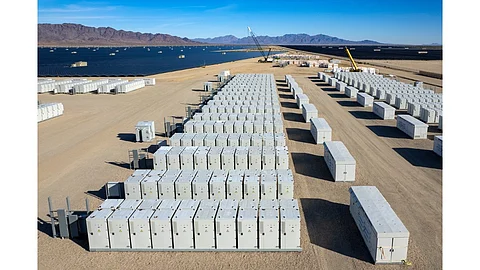

India has issued an advisory to include a minimum of 2-hour ESS capacity addition in all future solar tenders
This will need to be equivalent to 10% of the installed solar project capacity
The power ministry expects to install around 14 GW/28 GWh of storage by 2030 with this clause
In a significant regulatory update that will positively impact the country’s renewable energy industry, the Indian Ministry of Power (MoP) has issued an advisory to make it mandatory for all new solar PV power projects to have a minimum of 2-hour co-located energy storage systems (ESS). It will be equivalent to 10% of the installed solar project capacity.
The advisory is addressed to all Renewable Energy Implementing Agencies (REIA) and state utilities for their future solar tenders.
Distribution licensees have also been given the option to mandate 2-hour storage with rooftop solar plants as well to improve supply reliability at the consumer end and provide relief to distribution licensees from over-injection during solar hours.
Implementing agencies have the option to run the storage system in single-cycle operation or double-cycle operation. In single-cycle operation, it will be charged with co-located solar power and discharged during evening hours. In the double-cycle operation, the storage system can be charged by the solar system and also from the grid during low-demand hours and discharged during peak hours.
“This requirement will help mitigate intermittency issues and provide critical support during peak demand periods,” stated the ministry. It will be essential to ensure grid stability, reliability and optimal energy utilization as a massive volume of renewable energy is scheduled to come online in the near future.
With the new storage clause for future solar tenders, the ministry expects to install approximately 14 GW/28 GWh of storage by 2030. It sees the fall in battery prices to help lower the power purchase costs during evening hours when solar generation is not available and energy rates in the exchange are high.
As of December 31, 2024, India’s installed capacity of ESS was 4.86 GW, comprising 4.75 GW of pumped storage projects (PSP) and 0.11 GW of battery energy storage systems (BESS) facilities.
The ministry estimates that the country’s energy system will need 73.93 GW/411.4 GWh of storage capacity to integrate 364 GW of solar and 121 GW of wind capacity by 2031-32. This will be divided as 26.69 GW/175.18 GWh of PSP and 47.24 GW/236.22 GWh of BESS capacity. The country aims to achieve 500 GW of non-fossil fuel installed capacity by 2030 to which solar PV is estimated to contribute 280 GW.
India recently achieved the milestone of 100 GW of cumulative installed solar PV capacity. According to the Ministry of New and Renewable Energy (MNRE), there is another 84.10 GW under implementation, and 47.49 GW under tendering (see India Exceeds 100 GW Solar PV Capacity Milestone).
